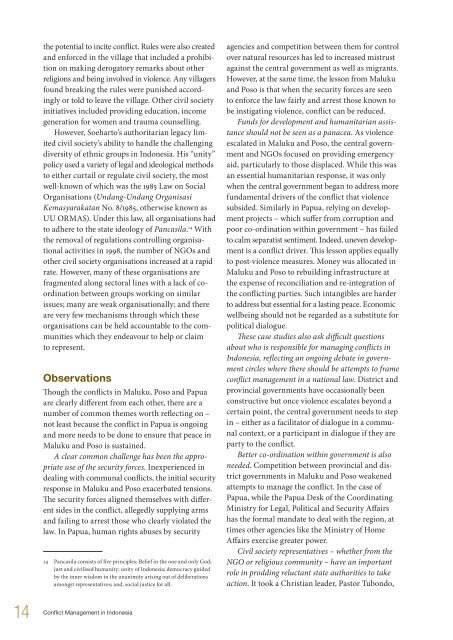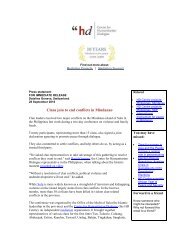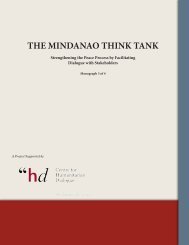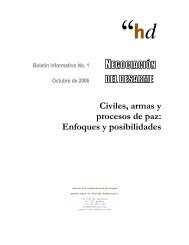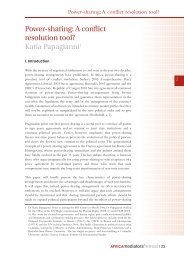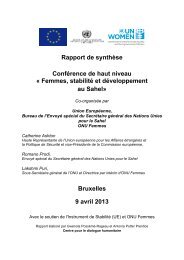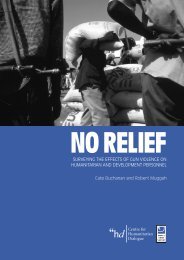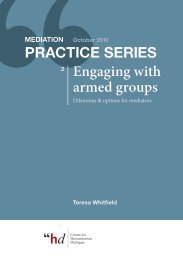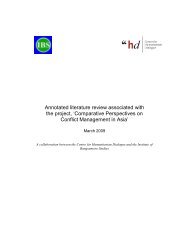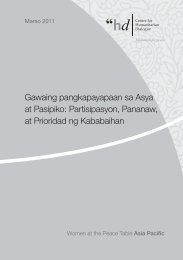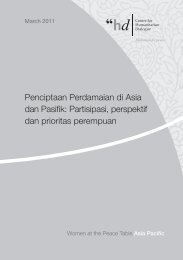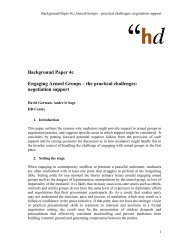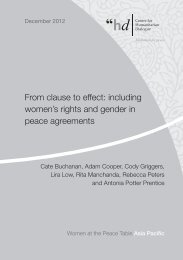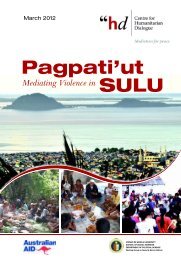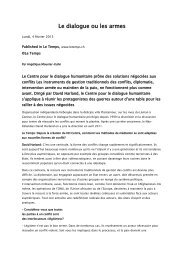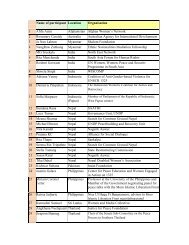Conflict Management in Indonesia â An Analysis of the Conflicts in ...
Conflict Management in Indonesia â An Analysis of the Conflicts in ...
Conflict Management in Indonesia â An Analysis of the Conflicts in ...
Create successful ePaper yourself
Turn your PDF publications into a flip-book with our unique Google optimized e-Paper software.
<strong>the</strong> potential to <strong>in</strong>cite conflict. Rules were also created<br />
and enforced <strong>in</strong> <strong>the</strong> village that <strong>in</strong>cluded a prohibition<br />
on mak<strong>in</strong>g derogatory remarks about o<strong>the</strong>r<br />
religions and be<strong>in</strong>g <strong>in</strong>volved <strong>in</strong> violence. <strong>An</strong>y villagers<br />
found break<strong>in</strong>g <strong>the</strong> rules were punished accord<strong>in</strong>gly<br />
or told to leave <strong>the</strong> village. O<strong>the</strong>r civil society<br />
<strong>in</strong>itiatives <strong>in</strong>cluded provid<strong>in</strong>g education, <strong>in</strong>come<br />
generation for women and trauma counsell<strong>in</strong>g.<br />
However, Soeharto’s authoritarian legacy limited<br />
civil society’s ability to handle <strong>the</strong> challeng<strong>in</strong>g<br />
diversity <strong>of</strong> ethnic groups <strong>in</strong> <strong>Indonesia</strong>. His “unity”<br />
policy used a variety <strong>of</strong> legal and ideological methods<br />
to ei<strong>the</strong>r curtail or regulate civil society, <strong>the</strong> most<br />
well-known <strong>of</strong> which was <strong>the</strong> 1985 Law on Social<br />
Organisations (Undang-Undang Organisasi<br />
Kemasyarakatan No. 8/1985, o<strong>the</strong>rwise known as<br />
UU ORMAS). Under this law, all organisations had<br />
to adhere to <strong>the</strong> state ideology <strong>of</strong> Pancasila. 14 With<br />
<strong>the</strong> removal <strong>of</strong> regulations controll<strong>in</strong>g organisational<br />
activities <strong>in</strong> 1998, <strong>the</strong> number <strong>of</strong> NGOs and<br />
o<strong>the</strong>r civil society organisations <strong>in</strong>creased at a rapid<br />
rate. However, many <strong>of</strong> <strong>the</strong>se organisations are<br />
fragmented along sectoral l<strong>in</strong>es with a lack <strong>of</strong> coord<strong>in</strong>ation<br />
between groups work<strong>in</strong>g on similar<br />
issues; many are weak organisationally; and <strong>the</strong>re<br />
are very few mechanisms through which <strong>the</strong>se<br />
organisations can be held accountable to <strong>the</strong> communities<br />
which <strong>the</strong>y endeavour to help or claim<br />
to represent.<br />
Observations<br />
Though <strong>the</strong> conflicts <strong>in</strong> Maluku, Poso and Papua<br />
are clearly different from each o<strong>the</strong>r, <strong>the</strong>re are a<br />
number <strong>of</strong> common <strong>the</strong>mes worth reflect<strong>in</strong>g on –<br />
not least because <strong>the</strong> conflict <strong>in</strong> Papua is ongo<strong>in</strong>g<br />
and more needs to be done to ensure that peace <strong>in</strong><br />
Maluku and Poso is susta<strong>in</strong>ed.<br />
A clear common challenge has been <strong>the</strong> appropriate<br />
use <strong>of</strong> <strong>the</strong> security forces. Inexperienced <strong>in</strong><br />
deal<strong>in</strong>g with communal conflicts, <strong>the</strong> <strong>in</strong>itial security<br />
response <strong>in</strong> Maluku and Poso exacerbated tensions.<br />
The security forces aligned <strong>the</strong>mselves with different<br />
sides <strong>in</strong> <strong>the</strong> conflict, allegedly supply<strong>in</strong>g arms<br />
and fail<strong>in</strong>g to arrest those who clearly violated <strong>the</strong><br />
law. In Papua, human rights abuses by security<br />
14 Pancasila consists <strong>of</strong> five pr<strong>in</strong>ciples: Belief <strong>in</strong> <strong>the</strong> one and only God;<br />
just and civilised humanity; unity <strong>of</strong> <strong>Indonesia</strong>; democracy guided<br />
by <strong>the</strong> <strong>in</strong>ner wisdom <strong>in</strong> <strong>the</strong> unanimity aris<strong>in</strong>g out <strong>of</strong> deliberations<br />
amongst representatives; and, social justice for all.<br />
agencies and competition between <strong>the</strong>m for control<br />
over natural resources has led to <strong>in</strong>creased mistrust<br />
aga<strong>in</strong>st <strong>the</strong> central government as well as migrants.<br />
However, at <strong>the</strong> same time, <strong>the</strong> lesson from Maluku<br />
and Poso is that when <strong>the</strong> security forces are seen<br />
to enforce <strong>the</strong> law fairly and arrest those known to<br />
be <strong>in</strong>stigat<strong>in</strong>g violence, conflict can be reduced.<br />
Funds for development and humanitarian assistance<br />
should not be seen as a panacea. As violence<br />
escalated <strong>in</strong> Maluku and Poso, <strong>the</strong> central government<br />
and NGOs focused on provid<strong>in</strong>g emergency<br />
aid, particularly to those displaced. While this was<br />
an essential humanitarian response, it was only<br />
when <strong>the</strong> central government began to address more<br />
fundamental drivers <strong>of</strong> <strong>the</strong> conflict that violence<br />
subsided. Similarly <strong>in</strong> Papua, rely<strong>in</strong>g on development<br />
projects – which suffer from corruption and<br />
poor co-ord<strong>in</strong>ation with<strong>in</strong> government – has failed<br />
to calm separatist sentiment. Indeed, uneven development<br />
is a conflict driver. This lesson applies equally<br />
to post-violence measures. Money was allocated <strong>in</strong><br />
Maluku and Poso to rebuild<strong>in</strong>g <strong>in</strong>frastructure at<br />
<strong>the</strong> expense <strong>of</strong> reconciliation and re-<strong>in</strong>tegration <strong>of</strong><br />
<strong>the</strong> conflict<strong>in</strong>g parties. Such <strong>in</strong>tangibles are harder<br />
to address but essential for a last<strong>in</strong>g peace. Economic<br />
wellbe<strong>in</strong>g should not be regarded as a substitute for<br />
political dialogue.<br />
These case studies also ask difficult questions<br />
about who is responsible for manag<strong>in</strong>g conflicts <strong>in</strong><br />
<strong>Indonesia</strong>, reflect<strong>in</strong>g an ongo<strong>in</strong>g debate <strong>in</strong> government<br />
circles where <strong>the</strong>re should be attempts to frame<br />
conflict management <strong>in</strong> a national law. District and<br />
prov<strong>in</strong>cial governments have occasionally been<br />
constructive but once violence escalates beyond a<br />
certa<strong>in</strong> po<strong>in</strong>t, <strong>the</strong> central government needs to step<br />
<strong>in</strong> – ei<strong>the</strong>r as a facilitator <strong>of</strong> dialogue <strong>in</strong> a communal<br />
context, or a participant <strong>in</strong> dialogue if <strong>the</strong>y are<br />
party to <strong>the</strong> conflict.<br />
Better co-ord<strong>in</strong>ation with<strong>in</strong> government is also<br />
needed. Competition between prov<strong>in</strong>cial and district<br />
governments <strong>in</strong> Maluku and Poso weakened<br />
attempts to manage <strong>the</strong> conflict. In <strong>the</strong> case <strong>of</strong><br />
Papua, while <strong>the</strong> Papua Desk <strong>of</strong> <strong>the</strong> Coord<strong>in</strong>at<strong>in</strong>g<br />
M<strong>in</strong>istry for Legal, Political and Security Affairs<br />
has <strong>the</strong> formal mandate to deal with <strong>the</strong> region, at<br />
times o<strong>the</strong>r agencies like <strong>the</strong> M<strong>in</strong>istry <strong>of</strong> Home<br />
Affairs exercise greater power.<br />
Civil society representatives – whe<strong>the</strong>r from <strong>the</strong><br />
NGO or religious community – have an important<br />
role <strong>in</strong> prodd<strong>in</strong>g reluctant state authorities to take<br />
action. It took a Christian leader, Pastor Tubondo,<br />
14<br />
<strong>Conflict</strong> <strong>Management</strong> <strong>in</strong> <strong>Indonesia</strong>


